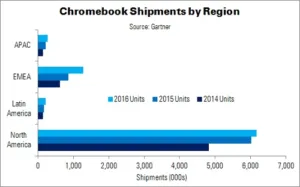The market for Chromebooks will grow to 7.3 million units this year, representing a 27% increase in sales from 2014, says Gartner.
Education is the main application for these devices, with a 72% share of the Chromebook market last year. By region, 72% of Chromebooks in EMEA, 69% in APAC and 60% in the USA were used for education in 2014.
Chromebook purchases remain low in business (16.5% in APAC, 1.1% in the USA and 0.9% in EMEA), despite interest from SMBs and verticals. However, Google is increasingly targeting this segment with new office applications and improved functionality. These products are particularly valued for their low price, simplicity and security.
In the consumer space, Chromebooks are gaining credibility but brand awareness must improve – especially outside the USA. Most users are tech-savvy individuals purchasing a Chromebook as a companion device, while others are purchasing as a low-cost PC alternative.
| Chromebook Unit Shipments By Region, 2014 – 2016 (000s) | |||
|---|---|---|---|
| Region | 2014 Units | 2015 Units | 2016 Units |
| North America | 4,820 | 6,020 | 6,177 |
| Latin America | 142 | 178 | 224 |
| EMEA | 620 | 866 | 1,276 |
| APAC | 146 | 225 | 276 |
| Total | 5,728 | 7,288 | 7,953 |
| Source: Gartner | |||
Connectivity remains an issue standing in the way of adoption, particularly in emerging markets – Chromebooks require an internet connection for most applications. Familiarity with the cloud and cloud-based applications is also important.
84% of Chromebooks were sold in North America last year, mostly in the USA. EMEA took 11% of sales, with Western Europe the primary focus for vendors. APAC represented less than 3% of the market in 2014; demand came from Australia, New Zealand and Japan.
Following Samsung’s withdrawal from Chromebook sales in Europe (Samsung Widens PC Exit to Cover Europe), Acer became the world’s leading vendor in 2014. The company sold more than 2 million devices. Samsung followed with 1.7 million sales, and HP – a late entrant – sold 1 million units.
Comment
Separately, sources in Asia say that Google’s Chromebook team has visited Taiwan in a bid to extend marketing of the products from the North American education segment to emerging regions.
To make the already-low-cost products more appealing to these markets, Google has adopted chip solutions from China’s Fuzhou Rockchip Electronics and won support to launch models from Haier and Hisense of China, Xolo of India and Nexian of Indonesia, said sources. (TA)

